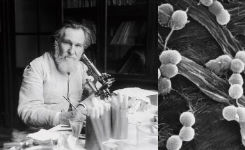
 All articles
All articles
The man who wanted to extend lifespan
Once upon a time, more than a century ago, Elie Metchnikoff hypothesized that health could be improved, and senility delayed by modulating the intestinal microbes thanks to bacteria present in yogurt. This zoologist and microbiologist was thus one of the first scientists to take an interest in gut microbiota and what we now call probiotics, the consumption of which he claimed helped to fight against aging.
This is the story of “the man who wanted to extend lifespan”.
Elie Metchnikoff was born in 1845 in a village in Russia. Forty-three years later, this Doctor of Science became head of the “morphological microbiology” unit at the Pasteur Institute. During this period, he demonstrated the elimination of foreign particles by devouring cells that he called “phagocytes”, which he understood were essential for protection against infections. This research earned him the title of Director of Scientific Research at the Pasteur Institute and the Nobel Prize in 1908 for his work on immunity.

Elie Metchnikoff
At the end of his career, as his vigor began to decline, Elie Metchnikoff became interested in the mechanisms responsible for senility and the means to slow them down. Because of his background, his attention was drawn to the inhabitants of Eastern Europe, particularly the Balkan states and Russia, which have an unusually high number of centenarians. Elie hypothesized that Bulgarian peasants owed their remarkable longevity to their high consumption of fermented dairy products.
To confirm his theory, the scientist immersed himself in the study of the structure and intestinal contents of many animal species and humans, bringing to light a multitude of putrefactive microbes, which can produce poisons. He identified bacteria such as Bacillus putrificus, sporogenes or welchii, capable of producing toxins such as paracresol and indol, which accelerate aging. In connection with his work on phagocytes, he then thought that the degenerations linked to old age were caused by phagocytes transformed into destroyers of healthy tissues due to intestinal bacterial toxins.
He then came up with the idea that the ingestion of Lactobacillus from fermentation reduces the toxicity of the endogenous microflora, exerting in return a beneficial influence on health.
By supplementing his diet and that of his animals with probiotics, Elie was able to directly observe a reduction in the level of toxins in the urine.
Elie thus affirmed that it is possible to “modify the flora of the organism and to replace harmful microbes by useful microbes”, reducing the deleterious effect of toxic compounds coming from putrefactive bacteria, which delays in fine the appearance of senility. Far from necessarily having a harmful effect on humans, bacteria can, on the contrary, contribute to their well-being. This was a novel idea!
Note also that this new way of eating allowed him to better face the trials and tribulations of life; as a scientist and philosopher, he shared his optimistic vision of human nature through various writings and recommendations.
These constitute the foundations of research on the beneficial effects of lactic ferments and on the importance of microbial diversity for health.